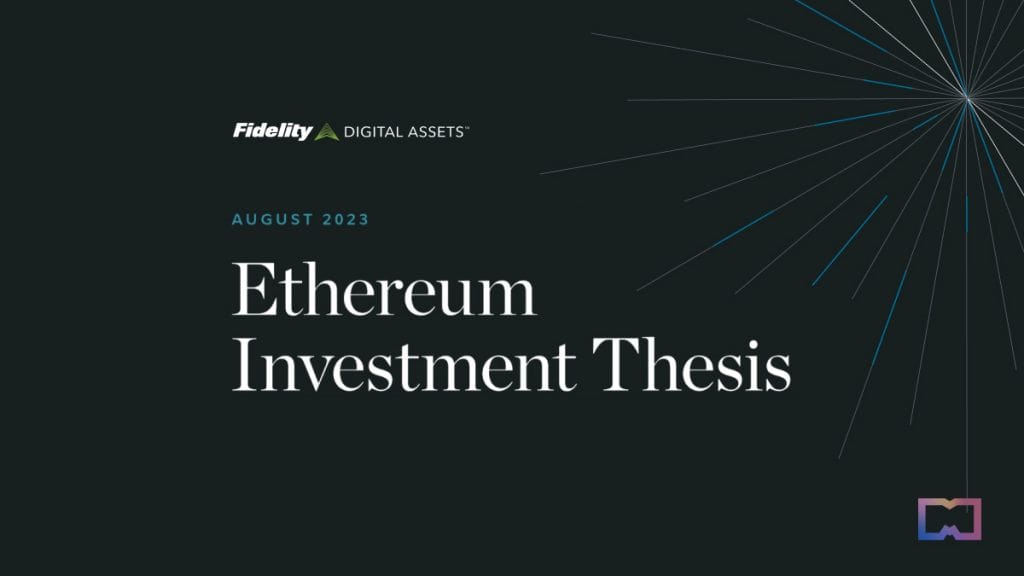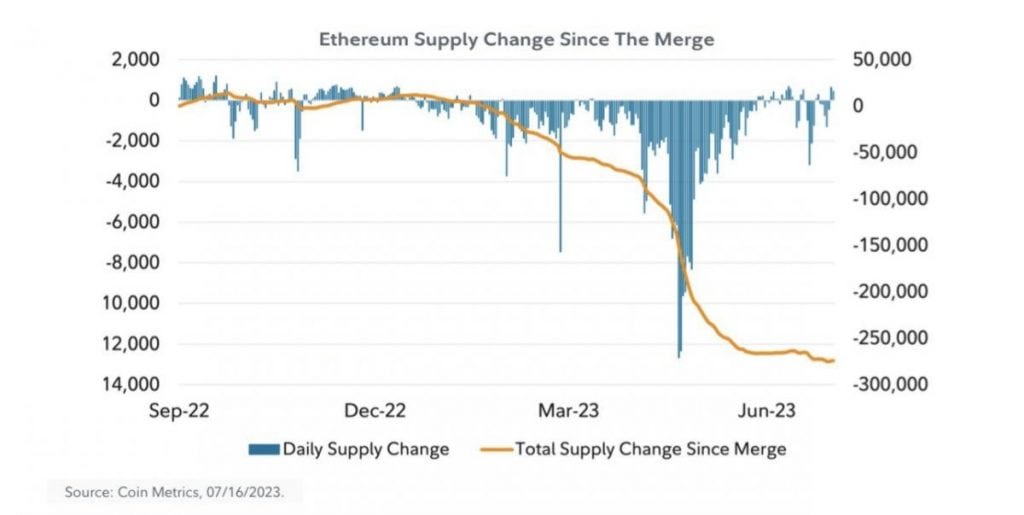Fidelity's Exploration of Ethereum Emphasizes the Importance of Network Demand in Shaping ETH Values
In Brief
The findings of the research emphasize that the perceived worth of Ethereum is closely linked to how extensively it is used.
While ETH shares features with Bitcoin in the realm of digital currency, it encounters substantial obstacles on its path toward universal acceptance as a monetary asset.
Ethereum's shift to a proof-of-stake model and the introduction of features like MEV have significantly altered its economic framework.

In a new research report Fidelity raises an essential question: how does the Ethereum network's functionality turn into value for its native currency, ETH?
Although users are reaping the technological advantages offered by Ethereum's broader ecosystem, investors are eager to grasp the motivations behind acquiring and retaining ETH beyond its role as a transactional currency.
Fidelity’s exploration of Ethereum evaluates its investment potential, while also examining various technical aspects that influence different investment viewpoints.
Key insights drawn from the report include:
- Value Associated with Network Activity: The perceived value of Ethereum is intrinsically linked to how it is utilized within the network and the evolving dynamics of supply and demand, especially post-The Merge.
- Utilization of the Platform and Value Growth: Enhanced usage of the Ethereum infrastructure could lead to increased value for Ether holders.
- Ether as a New Kind of Currency: One investment perspective considers Ether to be an emerging type of digital money, similar to Bitcoin.
- Struggles Against Bitcoin: The report recognizes that while various digital assets, including Ether, aspire to function as money, challenging Bitcoin's established characteristics and network advantages is a significant hurdle.
- Ether's Monetary Roles: The report analyzes Ether's capabilities in serving as both a store of value and a medium for transactions.
Ether’s Aspiration as Money
There's a prevailing notion in the cryptocurrency community that labels Bitcoin as a pioneer form of digital currency. This prompts the vital query: Is it feasible for ETH to step into a similar role? Ultimately, can we categorize it as 'money'?
Fidelity's insights suggest an affirmative response, albeit with certain qualifications. ETH certainly shares numerous qualities with traditional currencies, including its use as a transactional medium. Yet, significant distinctions remain.
Obstacles to Broad Acceptance
A primary challenge ETH faces in becoming a widely accepted form of money lies in its supply dynamics. Unlike Bitcoin, which follows a strictly defined supply schedule and is regarded as a secure digital currency by many, ETH's supply is theoretically boundless, dynamically changing based on various factors like validator numbers and burning processes.

Moreover, ETH lacks the solidified track record as a monetary asset that Bitcoin possesses. Ethereum undergoes upgrades on roughly an annual basis, which requires effort and attention from developers to cultivate a persistent performance history; this stability is crucial for maintaining trust amongst users.
Competing Forms of Money
While Bitcoin firmly establishes its place as a monetary asset, Fidelity argues that this shouldn't exclude the potential for alternative digital currencies, including ETH.
Ethereum stands out from its peers due to unique features such as its capacity to enable intricate transactions and execute smart contracts. These functionalities provide it with added utilities beyond the basic role of a currency.
Real-World Ethereum Integrations
Although we have yet to see widespread daily transactions on Ethereum, Fidelity points to significant current integrations between the Ethereum ecosystem and tangible sectors, as well as traditional finance:
- MakerDAO’s Substantial Investment: MakerDAO, which operates on the Ethereum platform, recently completed an impressive purchase worth $500 million, underlining Ethereum's increasing significance.
- Ethereum's Impact on Real Estate: Ethereum has achieved a notable milestone by facilitating the first sale of a U.S. house via a non-fungible token (NFT), illustrating its potential to revolutionize the real estate industry.
- Blockchain Bonds from the European Investment Bank: The European Investment Bank took a step into the blockchain universe by issuing bonds on the blockchain, demonstrating traditional finance's growing acceptance of Ethereum's technology.
- Franklin Templeton’s Ethereum-Driven Money Market Fund: Franklin Templeton has launched a money market fund that utilizes both Ethereum and Polygon to enhance transaction efficiency and maintain ownership records.
Hurdles on the Road to Widespread Adoption
While the integration of Ethereum with real-world assets is clearly progressing, the report highlights that numerous significant challenges remain.
These challenges encompass the need for ongoing network enhancements, regulatory clarity, educational initiatives, and the passage of time to foster confidence in Ethereum and similar platforms.
It could take years for Ethereum to achieve broad acceptance for routine transactions, leaving ETH as a niche currency for the moment.
Fidelity’s Concluding Thought
As per Fidelity, a crucial question for investors is whether Ethereum's robust developer engagement and the growth of applications will translate into actual value for ETH.
"Our analysis indicates that both theoretically and based on current data, increased activity on Ethereum's network boosts demand for block space, subsequently yielding cash flow that benefits token holders,\" Fidelity concludes.
"What’s also evident, however, is that these various factors are intricate, multifaceted, and have evolved over time with protocol upgrades and the introduction of scaling techniques, such as layer 2, and may continue to evolve going forward.\"
Disclaimer
In line with the Trust Project guidelines , please bear in mind that the content provided here is not aimed at and should not be interpreted as legal, tax, investment, or financial advice of any kind. It’s crucial to only invest what you can afford to lose and to seek independent financial guidance if you're uncertain. For more information, we recommend checking the terms, conditions, and support resources available from the issuer or advertiser. MetaversePost is dedicated to delivering accurate and unbiased reports, but please know that market conditions can change without prior notice.







